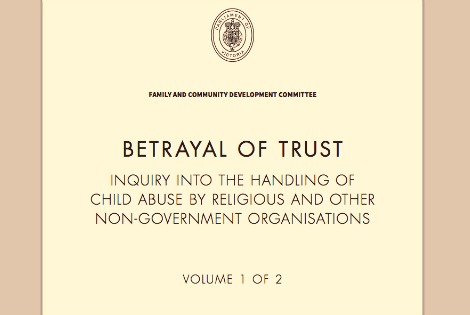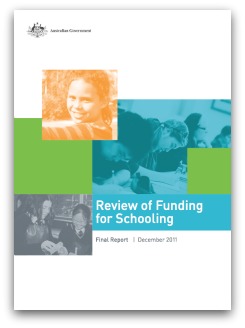Keywords: Non-Government Schools
-

AUSTRALIA
- Ray Cassin
- 14 November 2013
10 Comments
If the Catholic Church is mentioned frequently in the report of the Victorian parliamentary inquiry into the sexual abuse of children, Catholics and their leaders can hardly complain. Among the churches scrutinised by the committee, only the Salvation Army has an even remotely comparable record of abuse. The Napthine Government should implement the inquiry's recommendations — with one exception.
READ MORE 
-

RELIGION
- Frank Brennan
- 25 October 2013
2 Comments
'The Church should not give any appearance of hiding behind the corporate veil. Justice demands that present church leaders agree to satisfy any judgment debt against their predecessors or their deceased predecessors' estates when there is an allegation of past failure to supervise or adequately investigate a sexual predator in the ranks. Any damages should be paid from church assets.' Frank Brennan addresses the Australian Lawyers Alliance Conference, Rydges Lakeside, Canberra, 26 October 2013.
READ MORE
-

RELIGION
- Frank Brennan
- 04 September 2013
2 Comments
'The Towards Healing protocol is not a substitute for criminal prosecution of sex abusers. Nor is it a cheap alternative to civil liability for damages. It is a procedure available by choice to victims in addition to criminal prosecution of perpetrators or pursuit of civil damages for negligence by church authorities.' Full text from Frank Brennan's address to the Canon Law Society of Australia and New Zealand 47th Annual Conference, 4 September 2013 at Hotel Grand Chancellor Adelaide on Hindley.
READ MORE
-

EDUCATION
- Dean Ashenden
- 15 February 2013
7 Comments
A survey released this week found that the lion's share of philanthrpopic giving goes to independent non-government schools. Gonski devoted an entire chapter to the question of how private cash can be got to where need is greatest. The Government should act on his recommendation, but not before beefing it up.
READ MORE 
-

EDUCATION
- Chris Middleton
- 07 January 2013
2 Comments
The report's argument that a base level of funding be established might lead to a lowest common denominator approach to determining what is an 'efficient' education, in both the state and private systems. Creativity, diversity and experimentation may be hindered in such a regime. Friday 24 February
READ MORE 
-

EDUCATION
- Dean Ashenden
- 20 December 2012
16 Comments
In setting a target of Australia reaching the OECD's top five school systems by 2025 the Prime Minister has made a rod for her own back. It is difficult to see our present way of organising, funding and governing schooling getting us anywhere near that target. But what kind of system might?
READ MORE 
-

EDUCATION
- Chris Middleton
- 12 September 2012
5 Comments
The Prime Minister's credibility in announcing an education policy response before reaching agreement with the states may be questioned. Without the states, the implementation of Gonski is impossible. This was illustrated graphically by the NSW Government's announcement of funding cuts to Catholic and independent schools.
READ MORE 
-

EDUCATION
- Ellena Savage
- 31 August 2012
2 Comments
Once, my mother reprimanded a young student whom she taught at an expensive private school. The boy replied that his dad could 'buy and sell' her. As easy as it would be to conclude that private schools breed poor behaviour, rude children are just that — class has little to do with it.
READ MORE
-

EDUCATION
- Dean Ashenden
- 24 August 2012
6 Comments
Teacher organisations have advocated for one sector rather than opposing the whole flawed structure. Catholic bishops have insisted on public subsidies for avowedly exclusive schools. Governments have adopted policies which have entrenched a socially counter-productive organisation of a major public institution. How many more generations has this scheme of things got left to run?
READ MORE 
-

EDUCATION
- John Warhurst
- 09 July 2012
10 Comments
Labor speechwriter Graham Freudenberg observed that ‘the oldest, deepest, most poisonous debate in Australia has been about government aid to church schools’. The most dramatic episode in the history of church state relations in Australia was the Goulburn schools strike, which took place 50 years ago this month.
READ MORE 
-

EDUCATION
- Michael Furtado
- 16 March 2012
15 Comments
Given that Catholic and independent schools tend to produce better results than government schools, one would expect to be able to demonstrate that the non-government sector adds more value to a student's education. The evidence does not bear this out.
READ MORE 
-

EDUCATION
- Chris Middleton
- 24 February 2012
9 Comments
The report's argument that a base level of funding be established might lead to a lowest common denominator approach to determining what is an 'efficient' education, in both the state and private systems. Creativity, diversity and experimentation may be hindered in such a regime.
READ MORE 